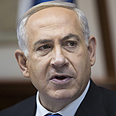
PM names main topics for Obama visit
Netanyahu says he and US president agreed to discuss three main issues: Iran's nuclear program, Syrian civil war and attempts to advance peace process
Prime Minister Benjamin Netanyahu said at Sunday's weekly cabinet meeting that he welcomes US President Barack Obama's intention to visit Israel this spring and noted he will discuss with him issues pertaining to Iran, Syria and the Palestinians.
The prime minister hinted of the connection between the visit and the coalition negotiations. "These issues, along with others that will be discussed, are of great importance and it is our obligation to treat them with the utmost seriousness. I believe they also call for the harnessing of forces in Israel."
Related Stories:
- Ayalon sees mini-summit during Obama visit
- White House: Obama plans to visit Israel in spring
- US ambassador to Israel sheds light on Obama visit
The prime minister further added, "This visit is very important and highlights the strong alliance between Israel and the United States. I think its importance is even more prominent in light of the great revolutions and upsets surroundings us in the Middle East, Atlantic Ocean, North Africa and Iran."
Netanyahu said that he and Obama have agreed on three main topics to be discussed during the visit: Iran's nuclear program, the volatile situation in Syria and its effects on regional security and attempts to further the peace process with the Palestinians.
Meanwhile, the New York Times reported Sunday that Israel is considering giving the Palestinians partial control over some areas of the West Bank, as well as releasing prisoners and freezing settlement construction ahead of Obama's visit.
The paper further reported that the United States is expected to release $200 million in aid to the Palestinian Authority that it has withheld for months.
It quoted experts as saying that changes may only occur in the margins.
"There is talk of giving the Palestinians partial control over some areas of the West Bank where Israel currently rules. Israel may release some longstanding Palestinian prisoners as a gesture," the paper said.
"Some Israelis and Americans are pushing the idea of at least a partial freeze of Jewish settlement construction in the West Bank in exchange for a promise by the Palestinians to postpone plans to use their new upgraded status at the United Nations to pursue claims against Israel in the International Criminal Court," it was further stated.
“What’s possibly new is not to simply focus on getting to negotiations, because that’s too limited,” said Daniel Kurtzer, a former US ambassador to Israel and Egypt who edited a recent book on the situation.
“We have to be able to do four or five things relatively simultaneously, so that no one can say we’ve prejudiced this peace process against them. It’s like a smorgasbord. You find a little bit that’s of value to you, and there are some things you don’t like, but the whole table is something that’s accepted.”
The New York Times questioned the likelihood of a "mini-summit" with Obama, Prime Minister Benjamin Netanyahu and Palestinian President Mahmoud Abbas, which was recently raised as a possibility by outgoing Deputy Foreign Minister Daniel Ayalon.
"In the end, it’s a question of whether the two leaders are serious about actually achieving an agreement, or whether they want to maneuver to blame the other for lack of progress,” said former US Ambassador Martin Indyk who now serves as the director of foreign policy at the Brookings Institution. “Is it a blame game, or a peace game?”
Obama, who is scheduled to visit Israel on March 20, intends to stay in Jerusalem for two days. He is slated to meet with various Israeli leaders and tour the Yad Vashem Holocaust Museum and Mount Herzl.
Incoming Knesset Speaker Binyamin Ben-Eliezer and his predecessor have called on the US president to address the Knesset. It remains unclear where Obama will give his speech. He is also slated to visit the West Bank where he will meet Palestinian President Mahmoud Abbas and possibly Prime Minister Salam Fayyad.
A Palestinian official revealed that the PA leadership learned of the presidential visit thorough the media which served to deepen suspicions of Washington's plans. "Coming isn't enough," advisor to the president Mohammad Shtayyeh said. "We'll wait and see what Obama brings with him," he added.
- Receive Ynetnews updates directly to your desktop










